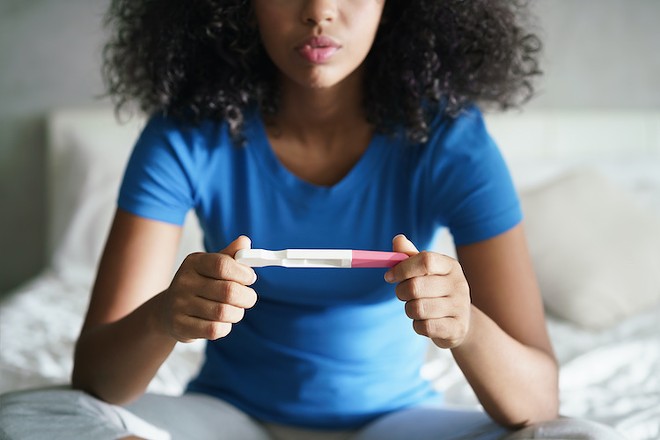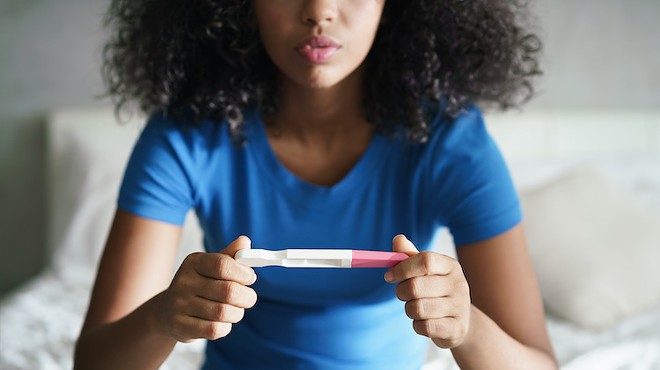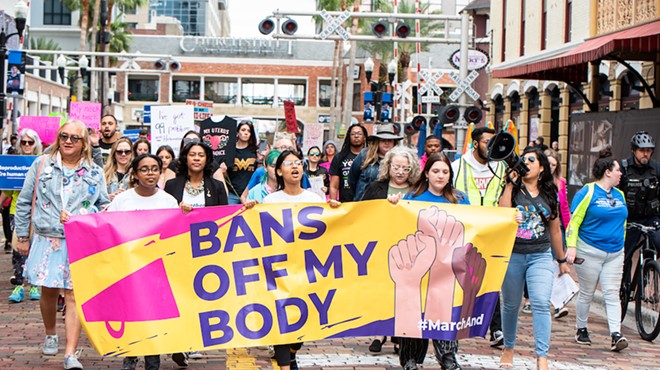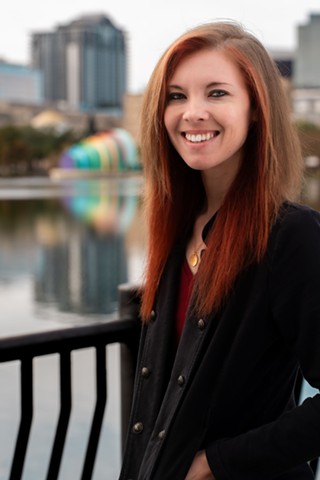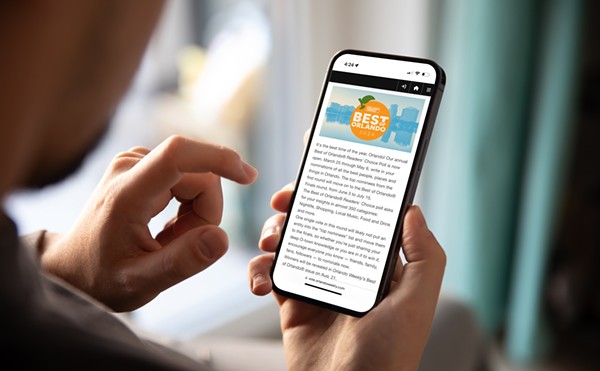A local nonprofit organization called Choices Women’s Clinic is opening a new crisis pregnancy center this year in Kissimmee.
It’s a launch that’s been months in the making. This will be Choices’ third location, and it’s opening with an explicit goal: to “change abortion in Orlando until there are zero.”
Crisis pregnancy centers, also known as “pregnancy resource centers” or “pregnancy centers,” are nonmedical, usually religiously affiliated facilities that market free services for people who are or suspect they’re pregnant.
They’re anti-abortion by intent, but often choose names and locations and use sophisticated marketing tactics that trick people into thinking they operate as reliable medical facilities.
Choices Women’s Clinic, the nonprofit chain that already has two locations in Central Florida, makes it clear they’re targeting Kissimmee’s Hispanic population, naming Hispanic women as one of the “largest demographic[s]” seeking abortion care today.
About 70% of Kissimmee’s population is Hispanic or Latino, according to U.S. Census data.
They’re also pointedly opening their new center within a mile of a Planned Parenthood clinic, the city’s only state-licensed abortion clinic.
The goal of opening the new “clinic,” slated for sometime this year, is to “bring light and LIFE to the Kissimmee community,” according to the nonprofit's website.
Max Carwile, programs director of Abortion Access Front — a group that supports abortion rights — sees it differently.
“Their goal is not to help pregnant people,” Carwile said, of pregnancy centers. “Their goal is to lie to pregnant people, to deceive them.”
“People should know all their options, but they’re not getting all of their options at these places.”
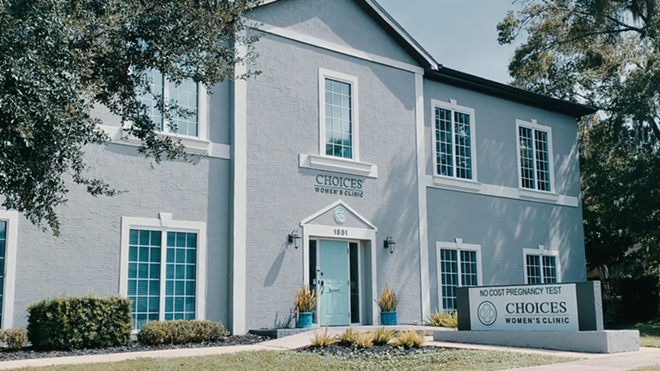
Deceptive practices at crisis pregnancy centers
Formerly known as True Life Choice, Choices Women’s Clinic was founded in 1983 by a group of anti-abortion Christians.
Although the center brands itself a “clinic,” it is not a state-licensed medical facility, although it does list licensed medical professionals on staff.
Like most “pregnancy centers,” it’s not regulated as a medical facility and it's subject to little government oversight — though these facilities do receive government dollars. In fact, Florida’s recent six-week abortion ban, SB 300, contains a provision more than quintupling their funding with taxpayer money.
It’s one of 2,500 anti-abortion centers in the United States, and one of over 160 in Florida, outnumbering actual abortion clinics in the Sunshine State three to one.
They've proliferated in recent years, as abortion clinics have shuttered.
Most offer a free but limited selection of services for unplanned pregnancies, such as free pregnancy tests, ultrasounds, and STI/STD testing.
They advertise on billboards (“Pregnant? Need help? Call xxx-xxxx").
Many use manipulative tactics to lure people in, and sometimes provide false information about pregnancy to shame and deceive people in vulnerable positions who come to them for help, as part of their mission to prevent people from getting an abortion.
Choices Women’s Clinic, run by executive director Vicky Mathews since 2015, is affiliated with CareNet, the nation's largest evangelical Christian network of crisis pregnancy centers, which primarily operates in the U.S.
The nonprofit Choices currently has two locations in operation: a facility on Colonial Drive in Orlando, and another on Carrigan Avenue in Oviedo, near the University of Central Florida.
Both are located near current or former abortion clinics.
“There’s a Planned Parenthood there [near the university], so that’s where we went,” Mathews shared in an interview with an anti-abortion website in 2021.
Staff at their Oviedo facility just celebrated its two-year anniversary.
Their clinic on Colonial Drive was their first to open — albeit, after being relocated in 2016, following their rebranding from “True Life” to “Choices.”
At the time, there was an abortion clinic located on Colonial Drive that has since shuttered.
According to a 2015 Facebook post, the clinic had initially planned to relocate their facility closer to one of Orlando’s only remaining abortion clinics, where anti-abortion protesters still gather every day the clinic’s open to harass (they call it “help”) patients.
“Let’s rise up faith community and be the FIRST CHOICE for women to receive professional services and the love of Jesus,” the nonprofit wrote in the 2015 post.
In recent years, the nonprofit has seen an uptick in activity, according to self-reported information published by GuideStar.
In 2022, for instance, the nonprofit reportedly saw 3,161 patient visits, up 20% from the year prior. They provided over 2,300 pregnancy tests, and provided over 2,100 ultrasounds.
At least 525 of their patients, they report, “chose God.”
This, according to the organization, is the number of women “we were able to confirm that they Chose Life over Abortion.”
That number has decreased nearly 50% since 2020.
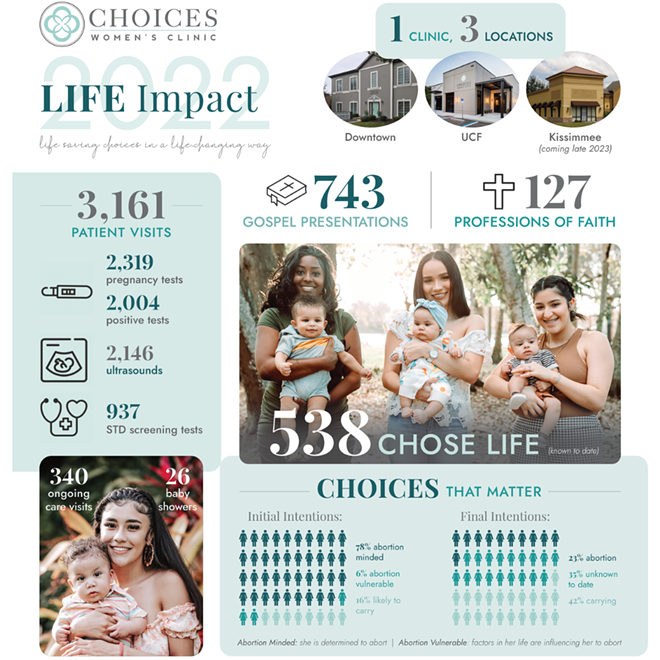
A campaign to ‘change abortion’ in Orlando
Choices Women’s Clinic first announced their campaign to open a third location in the Orlando metro area last November.
Executive director Mathews, who has described her role with the nonprofit as “truly a God thing,” gushed over the news in a video posted to social media.
“We are willing to go where abortions are happening, and to change abortion in Orlando,” she shared, jovially.
But, she told viewers, the nonprofit needed $500,000 in 100 days to match a grant they’d received from an unspecified donor.
In March, Mathews posted another update: They’d received the keys to their new property in Kissimmee.
Records from the county's property appraiser confirm that Choices purchased a property, located at 1011 Brack St., in March 2023 for about $2.1 million. It's located 0.7 miles from a nearby Planned Parenthood.
Tax filings show the nonprofit, in total, received $2.7 million in contributions and grants in 2021. That's the latest data made publicly available. They reported $2.8 million in revenue, and $82,000 in government grants.
The state of Florida is one of at least 14 states that fund pregnancy centers, funneling millions in taxpayer dollars to the anti-abortion movement.
That money is distributed by the state to the Florida Pregnancy Care Network, a not-for-profit alliance of about 60 “pregnancy support organizations” that offer “services that promote and encourage childbirth.”
One of those is the Beyond Pregnancy Care Center, another anti-abortion center in Kissimmee, which received $22,500 from the FPCN last year, according to a tax filing.
Some anti-abortion center operators, like the Catholic Charities Diocese of St. Petersburg, also receive local taxpayer dollars.
Choices Women’s Clinic, however, is not listed as an organization that’s received funding from the FPCN, nor is it promoted by the not-for-profit on its website.
But, they are promoted by anti-abortion activists like John Barros, an Evangelical “sidewalk counselor” who camps outside of an abortion clinic just south of downtown Orlando every weekday. As he's done for twenty years.
When Orlando Weekly visited the clinic in May, Barros handed a female reporter a flyer for Choices Women’s Clinic, which he and other anti-abortion protestors hustle to shove in the faces of the abortion clinic's patients and any passerby.
Even if Choices, the anti-abortion center, doesn’t receive state tax dollars, dozens in the state do.
And that pool of money is set to see a major boost with Florida’s new abortion law, approved in April. In addition to further restricting abortion rights, that law provides a five-fold increase in taxpayer funding for anti-abortion centers, from $4.5 million last year to $25 million.
Florida Gov. Ron DeSantis, who’s running for president in 2024, prioritized that law, even though it doesn’t appear to be very popular with Florida voters of any party affiliation.
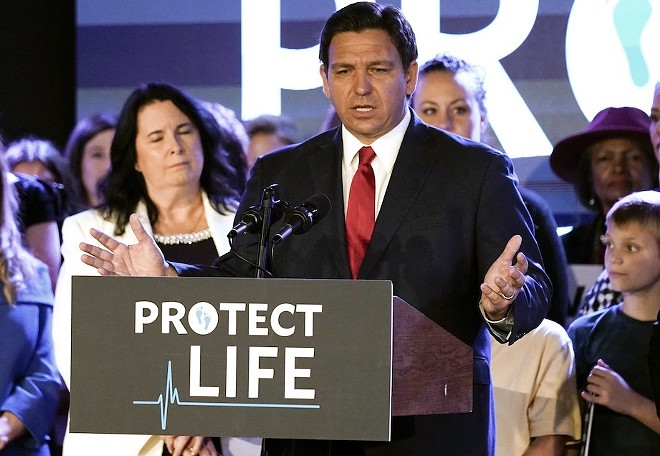
Aurelie Colon-Larrauri, a policy advocate for the National Latina Institute for Reproductive Justice, told Orlando Weekly she’s concerned about what this funding boost will do for pregnancy centers, especially those that make a point of targeting racial and ethnic minorities.
Located in South Florida, the former Planned Parenthood organizer sees this targeted tactic in her community, too.
Pregnancy centers go after young people and communities of color, Colon-Laurrari said, by buying billboards in Spanish-speaking neighborhoods. They often use photos of Black and brown people on their websites, and buy ads on sites that they know Black and Latinx people are visiting.
“They know that racialized groups tend to be the most, you know, uninsured, lower income groups, and they know that people are looking for resources when they are pregnant.”
A 2010 report from the Family Research Council, a Christian think-tank that lobbies for abortion restrictions and anti-LGBTQ policies, noted a concentration of abortion clinics in “urban, minority and poorer areas of the U.S. is well-known.”
To address this, Heartbeat International, a worldwide network of anti-abortion centers launched what they called an "urban initiative" in places like Miami and Los Angeles.
The goal? To “[identify] the neighborhoods in greatest need” of abortion alternatives, the “most abortion-plagued” communities.
Research shows that people of color tend to obtain abortions at higher rates than others, yet also face social and economic barriers to safe reproductive healthcare.
Choices Women’s Clinic and other pregnancy centers emphasize that their services are free and collect items such as baby clothes and diapers to offer, free of charge.
Most pregnancy centers also offer free ultrasounds (even when they don’t have credentialed professionals on staff to provide them) which a poor, uninsured person might seek in order to qualify for Medicaid.
Choices Women’s Clinic does have three licensed sonographers on staff, all of whom were verifiable through the American Registry for Diagnostic Medical Sonography.
However, Orlando Weekly could not verify the license of at least one of three registered nurses (RN) on staff, based on a search through the Florida Department of Health’s online portal.
Choices also has a medical director: Tamberly “Tammy” McCarus, a state-licensed MD, who reportedly announced a run for state office in 2020 as a Republican. Her name never even made it onto the primary election ballot.
Carwile, with Abortion Access Front, says that the material support that pregnancy centers like Choices offer for patients often come with strings attached: mandatory workshops, generally religious in nature, or “counseling.”
Plus, that practical support is finite. You don’t get free diapers forever.
People who are denied abortion care are more likely to be pushed deeper into poverty, but this isn’t something that’s communicated by pregnancy center staff.
People who are denied abortion care are more likely to be pushed deeper into poverty, but this isn’t something that’s communicated by pregnancy center staff.
tweet this
A landmark study, published in 2020, found that 95% of women who get an abortion don’t regret it more than five years out.
Those denied abortions, however, are more likely to be raising children alone, lack enough money to cover basic expenses, and are more likely to report life-threatening complications during birth.
Hispanic women, in particular, also face barriers to prenatal resources. “It’s already like, barriers upon barriers that people are already facing to receive health care,” Colon-Larrauri said.
Some pregnancy centers will also flat-out lie to those who walk through their doors.
By, for instance, warning patients that contraceptives cause cancer or infertility. Lying about how far along a person is in their pregnancy.
A 22-year-old Central Florida woman who visited a pregnancy center in Pinellas Park told Orlando Weekly that staff gave her an ultrasound, and told her they could hear her “baby’s” heartbeat at the time. (We have agreed not to use her name.)
She was just a few weeks pregnant when she visited in 2021.
“I felt cornered,” she said of her experience. She'd searched online and called places to try and get help for an unconfirmed pregnancy, and the pregnancy center was the first place to get her in.
Upon her arrival, the young woman noticed signs, in retrospect, that indicated something wasn't right: There was Christian music playing in the waiting room, staff that wouldn't let her fiancé in with her as they shuffled her inside for an ultrasound. A pregnancy test that looked like it came straight from Dollar Tree. A sonographer who left early for her second job at a nearby hospital.
Afterwards, she felt confused. Scared. And conflicted. She wanted an abortion, but felt shamed. She says receptionists from the center called her for weeks afterward, at least weekly, to ask if she'd kept her baby or aborted.
She asked them to stop calling. And, she said, they didn't — until she told them she was planning to go through with her pregnancy.
How CPCs work to appeal to anti-abortion donors
Anti-abortion pregnancy centers will often use marketing strategies to target people who are searching for abortion clinics online.
Some, like Choices, will set up two websites online: a main website for “clients” that’s stuffed with the term “abortion” (while not explicitly promising to provide it), and a second website for “donors” that’s much more transparent about their true aims.
The first is polished, whitewashed, and offers "options." The second is filled with bible verses.
Although Choices declined an interview with Orlando Weekly, the nonprofit shared in a recent Facebook post that abortion procedures are “easily accessible” through 15 weeks of pregnancy, and proclaimed, “No woman wants to have an abortion.”
Colon-Larrauri said abortions can actually be fairly inaccessible, particularly for people who are low-income and people of color.
Especially if someone accidentally visits a pregnancy center, mistakenly believing they’ll be able to get an abortion.
“Many folks of color, or folks that have lower incomes, they work multiple jobs, do not have paid leave or they lack transportation,” said Colon-Larrauri. “So making a trip to a provider that they thought was going to give them information, medical care, and being deceived by that, that might actually delay that, to get them the care that they need. Because they might not have another opportunity to take time off for work or arrange transportation.”
Organizations like Florida Access Network and the Tampa Bay Abortion Fund try to help provide financial and practical support for people seeking abortion care.
But, with restrictions on abortion in place in over a dozen states across the country, the clock is ticking for those who find themselves grappling with an unwanted pregnancy.
Florida’s new abortion law bans abortion after six weeks, which leaves little time to handle the logistics of obtaining an abortion.
Due to an ongoing legal challenge, however, abortion is still legal for up to 15 weeks of pregnancy in Florida. For now.
Central Florida is home to at least one dozen anti-abortion pregnancy centers, according to a tracker by Expose Fake Clinics.
Across the U.S., many are also looking to expand their capacity following the overturning of Roe v. Wade, the U.S. Supreme Court decision that previously guaranteed a constitutional right to abortion.
“They are very well-funded and well-resourced,” said Carwile, who once visited a pregnancy center in Tennessee, and now works to publicize the truth about them.
“I think there’s a misconception that these are like small little charities in communities opening up just trying to talk to people. They don’t understand this is a global network.”
Choices, for its part, is affiliated with two major anti-abortion organizations: CareNet and Heartbeat International, a worldwide network of more than 3,000 anti-abortion pregnancy centers.
Choices’ executive director Mathews didn’t want to talk to Orlando Weekly for this story. She declined an interview.
But, according to their donor website, the nonprofit is hoping to open their new location in Kissimmee later this year.
“We want to make abortion unthinkable and we won't stop until there are ZERO,” the website reads.
This story used research shared by the Reveal Reporting Network.
Subscribe to Orlando Weekly newsletters.
Follow us: Apple News | Google News | NewsBreak | Reddit | Instagram | Facebook | Twitter | or sign up for our RSS Feed

